Under siege by liberals: the town where everyone owns a gun | US news
There’s an empty stretch of field off highway 141 in Colorado that used to be the perfect American town. Small houses with white picket fences boasted big flower gardens. Kids played kick the can in the streets, rode their bikes, splashed in swimming pools. On Sundays, they might have watched an Elvis movie on TV. The rent was cheap, the fathers all worked, the mothers stayed at home.
Uravan was placid, friendly and, in most of the ways people usually measure it, safe. For many years, a former resident recalled, there was no law enforcement in the mining company town. Nobody needed it. The kids were good kids, because if they weren’t, the company bosses would kick their whole families out.
The town, named after the minerals extracted and processed there, had secretly supplied uranium to the Manhattan Project during the war. Afterward, the cold war uranium boom made the town prosper.
Things changed in 1986 when Uravan was declared a Superfund site contaminated by hazardous waste. The mine closed, residents moved out. The entire town â€" the trees, the houses, the post office, the Coke glasses from the drug store â€" was shredded and buried in a concrete-lined hole. The only thing left behind was the town’s metal flagpole, which was moved to the abandoned baseball field.
“When they bury your whole town, they bury your history. There’s a little bit of shame to that,†said Jane Thompson, who grew up in Uravan. Her parents were the second to last family to move out.
Thompson drove me through Uravan early one Sunday morning, pointing to the dip in the ground where the gas station had been, the block of houses where she had grown up. There was nothing left except scrub, battered earth and fences with signs warning, “Caution â˜¢ï¸ Radioactive Materials.â€
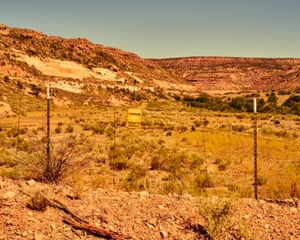
Thomas and her family now live just down the road in Nucla, a shrinking rural town still dependent on the mining industry.
Nucla became nationally famous when it passed an ordinance requiring every household to own a gun five years ago â€" a move that is still wildly popular among residents. But past Nucla’s one minute of fame, locals worry about their beloved home becoming a ghost town.
In September, in the wake of a lawsuit from an environmental group, Nucla’s major employer, the local coal-fired power plant, announced that it would be shutting down in 2022. The coal mine that supplied the plant would be shutting down as well. In total, about 80 jobs were at risk â€" a huge number in a town whose population boasted, according to the 2010 census, only 711 people.
For locals, this decision was a death knell brought on by liberals who live in big cities. Nucla residents bristle at the warnings about the risk of exposure to radiation, and roll their eyes at A-listers like Darryl Hannah, the Hollywood actress known for Splash and Kill Bill, who joined the activism against the local uranium industry.
Liberals fighting against the mining industry are good at telling them no, residents say, but don’t present them with any alternatives â€" not ones that come with real salaries. Richard Craig, a former Nucla town board member, recalled a comment by a member of an environmental group saying during one of the contentious hearings: “Well, I don’t see why they don’t want to go live in the city.â€
“It’s almost like â€" I hate using this word, it’s being used so often â€" it’s almost like a conspiracy: ‘We need to move everybody out of rural areas and go live in the cities and suburbs,’†Craig said.
Every household has to own a gun
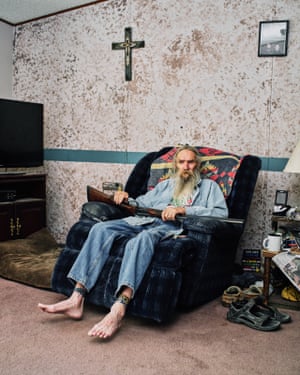
Nucla made national headlines in 2013. That year, in the wake of the Sandy Hook mass shooting that left 20 first-graders dead, Colorado passed new gun control laws, banning the sale of new ammunition magazines with more than 15 rounds and requiring that private citizens perform criminal background checks before selling guns to each other. The laws were hailed by gun control advocates nationwide as a sign of progress despite the gun debate stalemate in Washington.
Nucla moved in precisely the opposite direction: it passed an ordinance mandating that every head of household had to own a gun.
Kennesaw, Georgia, had passed a similar ordinance in 1982. After Craig heard about it, he proposed the idea in a town board meeting. “It was kind of a joke to start with,†he said, sunk deep into the blue plush chair in his cluttered living room. But the reaction from other town board members was immediately positive. Nucla locals, who had been fighting with liberals for years over uranium and coal, loved the idea.
“They said, ‘That sounds cool,’†he says. “I went, ‘Uh-oh.’â€
Craig received congratulatory phone calls from gun rights groups across the country, and the town took the national media attention in stride. Locals still talk fondly of the controversy over the town’s prairie dog shooting contest in 1990, which attracted dozens of animal rights activists and made the pages of People magazine. (During the shoot, the Los Angeles Times reported, picketers chanted “What are you gonna shoot when the prairie dogs are gone?†and a local woman called out: “Protesters!â€)
Craig himself saw the ordinance as responding to yet another irrational liberal attack on rural jobs. After Colorado passed its law on magazine limits, Magpul, a company that manufactures firearms accessories, left the state of Colorado in protest for Wyoming, where it reportedly expanded its workforce and secured a lucrative contract to provide ammunition magazines to the US marine corps.
But he was dismissive of Barack Obama’s controversial analysis during his 2008 campaign that small-town residents “get bitter†and “cling to guns or religion or antipathy to people who aren’t like them†as a way to channel their frustration. “The jobs have been gone now for 25 years and nothing’s replaced them,†Obama had said. “And each successive administration has said that somehow these communities are going to regenerate and they have not.â€
Craig maintains that Nucla’s love of guns is not rooted in bitterness. Even before the new rule was approved, most people in Nucla were already gun owners. The ordinance itself contains broad exceptions, not only for felons and those with a mental illness, but also for people who cannot afford a gun or simply wish to be “conscientious objectorsâ€. This makes it more or less unenforceable.
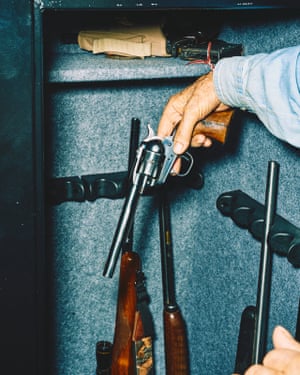
Still, Nucla’s commitment to gun ownership is no joke. There’s a tiny pink sign decorated with pistols at the local sheriff’s department â€" it reads: “We don’t call 911.†The town has no bars, no liquor stores, no movie theaters or malls, but it does have its own public gun range, free for use by all.
The few local Democrats are no exception, including Craig himself and the local pharmacist, who was a prize-winning competitive shooter in college. Nucla’s historian, Marie Templeton, keeps a beloved gun her husband gave her as an anniversary gift.
“I’m sure that the people who live in cities have no conception of what a gun means to a person in a small town like this. What do you use a gun for? Well, you kill rattlesnakes, for one thing!†she said. She got up from her kitchen table to fetch a stack of photographs of mountain lions and bears that had been spotted in her neighbor’s yard.
The ordinance didn’t even faze Shirley Miller, an Englishwoman who moved from Essex to be with her American husband. She said her adjustment was easy for the most part. Coming from a small village to the east of London, Great Wakering, she finds small-town England and small-town America mostly alike, except for Nucla’s blazing, dusty summers and, of course, its bounteous guns.
That aside, Nucla’s culture is not so different from small English villages, Miller said: the lack of diversity; the mix of open-mindedness and old prejudice among the residents. There have been small adjustments. She imports her Tesco and Yorkshire tea by mail, along with the occasional package of sultanas and Marmite, and each year she lets a friend’s sheep graze in the empty pasture by her house, adding a nice pastoral touch to the property. She refuses to say a word against the gun ordinance.
“Although I come from a culture where there are no guns, and it’s different here, I don’t see the problem here in Nucla,†she said diplomatically. “If I were living in the city [these gun laws] would worry me. Here it doesn’t,†she said before adding wryly: “There is no crossfire here.â€
Even the town’s emergency medical technician â€" the major healthcare provider in the area during the night, when the local clinic is closed â€" said he carried a gun, as did the ambulance driver. The EMT, Jeff Stephens, said the ambulance had been held up twice.
Last November, officials said, a heavily armed man with a history of anger at law enforcement opened fire on a sheriff’s deputy while he was driving in a remote area not far from Nucla. The officer returned fire, killing the man. A local prosecutor found the officer’s actions justified.
But that shooting was an anomaly for the area. “Prior to that, the last violent shooting was in 1986 or so,†Stephens said, when a man tried to break up a fight between a man and his wife outside a bar in Naturita, the town next door, and was shot to death.
Stephens said he does see occasional firearm accidents. There were two in recent memory: one a man shooting himself in the leg, another a young man shooting his partner in the knee. Both shootings involved alcohol, he said.
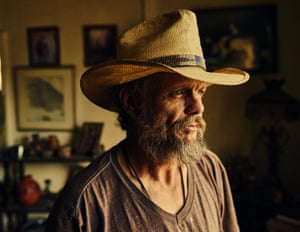
Word travels quickly in a town of a few hundred people. I had given Craig, the architect of the gun ordinance, a call in advance of my trip to Nucla, and shortly after I arrived in town he tried to reach me on my cellphone. I didn’t immediately pick up, so Craig called the front desk of the hotel one town over, and a hotel employee dashed downstairs as I was starting to eat lunch. She handed me a fluorescent post-it note: it had Craig’s name and home number on it.
By my third day in town, a woman stopped me outside of Nucla’s one restaurant, the Fifth Avenue Grill, to recommend someone for an interview. Had we met the day before? I wondered, confused. We had not. But she had heard all about me already.
Later that day, a stranger in the burger joint one town over, a 1950s-style diner run by Seventh Day Adventists, broke into my note-taking to warn me that I had better be writing a nice story. I pulled up a chair to his family’s table. His son was just hoping the jobs would hang on long enough for his daughter to graduate from high school.
Many of the residents were no strangers to the boom-bust cycle of the mining industry. It’s always been boom and bust, they told me, for the past hundred years. Sharon Johannsen, Jane Thompson’s sister, had been forced to leave town during a mining slump. Her family had only been able to return many years later, but her husband was now working at the coal mine that was slated to be closed.
Many end up moving away for good, but the ones who stay or return are fiercely committed to the landscape and the isolation, the need for self-reliance. The nearest Walmart is more than two hours away. On the mile marker partway down the winding 100-mile road that leads to the closest hospital, locals have tied a pink ribbon to commemorate the place where a healthy little girl had recently been born.
Grand Junction, that nearest larger town, has a population of just over 60,000. Several Nucla residents told me, with disgust, that they could not imagine living in a town that big, and some said they tried to visit as little as possible. Multiple men confided woefully that Nucla had a hard time attracting managers for certain jobs because their wives could not bear to live so far away from a shopping centre.
A bastion of socialism
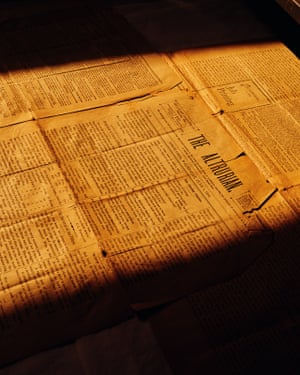
Today, western Colorado is perceived as a conservative region. At a Blues in the Park night in Naturita, a stranger visiting the town, red-faced and somewhat inebriated, cornered me and began ranting about freeloading immigrants and American values.
“This country wasn’t built by socialists!†he told me.
“Actually,†I said politely, “this area, right here, this was built by socialists.â€
In 1893, a financial crisis devastated thousands of companies and caused the unemployment rate to spike above 10% for several years. Workers lost their homes and families went hungry. According to one history of the town, a group of Denver families who had become homeless and who were “united in their wish to escape tyrannical landlords†provided the impetus. In 1894, a group of 10 idealists in Denver formed the Colorado Co-Operative Company, with the goal of moving into the wilderness to create a new community â€" a place “where equality and service rather than greed and competition should be the basisâ€.
The utopians spent nearly10 years digging an 18-mile irrigation canal through the arid landscape to bring water from the San Miguel river to the dry hill where they planned to build their colony. Money was tight, food scarce and the workers labored for shares in the eventual water rights in the canal they were digging by hand. To outsiders, the whole plan seemed like madness: how could anyone build a major irrigation canal without any capital?
To expand their group of workers and supporters, the cooperative society established a newspaper, the Altrurian, to share news about their progress nationwide. It covered the day-to-day debates, including updates on the type of cabbages and lettuces that had been planted to feed the workers, as well as features on vegetarianism, marriage and violent labor strikes in other states.
The paper advertised in-person cooperative club meetings across the country, including in Brooklyn, and was not too proud to beg for subscription pennies. “If you have received one cent’s worth of information from this week’s Altrurian, and are not already a subscriber, can you not afford to be a subscriber?†it prompted.
When the ditch was finished, the utopians named their town Nucla after the word nucleus, a strange premonition of the town’s nuclear future. Socialism broke down only a few years later. In 1914, Nucla voted down its “single tax†system, in which the cooperative company owned all the land in town and paid one tax on it to the government, in favor of private ownership.
Today, Thompson argues, it’s the labels on the town’s politics that have changed, more than the values themselves. The old-school cooperative mindset “really maybe has more to do with conservatism than we think: independent, not needing the government, not needing a landlord, not needing a boss or a big corporationâ€.
The ditch is still owned and managed collectively by the Colorado Co-operative Company, which the utopians founded in 1894. It has about 170 shareholders, and in the summer, group meetings have to be held late in the evening to make it easier for local ranchers to attend after work.
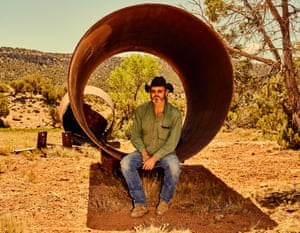
Monte and his son Dean Naslund have a strong connection to the ditch: five generations of their family have worked rebuilding and maintaining it over the years.
I drove out with Dean late one morning, after the day’s first real work had been done. The ditch was unlined, just a channel dug in the dirt, 16-20ft wide at the top, carefully designed to flow downhill all the way from the San Miguel river to Nucla.
Naslund stopped periodically to use a pitchfork to clear branches out of ditch gratings. The back of the pickup was filled with tools, mixed with old chunks of red-and-black rock â€" fossilized dinosaur bone, Naslund said. Golf balls sit near the front seat. He finds them “floating down the ditch â€" from Telluride, I suspectâ€.
Golf balls aren’t the only trace of the liberal resort town that end up downstream in Nucla’s water.
“There’s been a few people who say they found some other things from Telluride,†Naslund said, and paused. “Sexual endeavor things,†he added, delicately.
The mortal enemy next door
Telluride, just an hour away, is Nucla’s polar opposite. The town, which hosts a film festival, is cosmopolitan and populated by the elite, a favored site for second or even third homes. Oprah Winfrey reportedly bought 60 acres of land there in 2014 and spent $14m on one of the town’s most lavish mansions (it has a wine cellar designed to look like a historic mine).
To make ends meet, Nucla residents clean Telluride’s rental condos and help construct its elaborate mansions, with their enormous chandeliers and granite toilet seats and computerized bidets. One Nucla resident recalled walking into a bathroom in Telluride and feeling startled as “the toilet opened by itselfâ€.
The class tensions between the two towns are exacerbated by stereotypes. Telluride people think the small towners’ exposure to radiation means they “can’t think properlyâ€, said Kyle Webb, a 28-year-old who had moved from Denver to Nucla, in part because of its gun ordinance.
Meanwhile, the avowed environmentalists are building giant mansions with heated driveways to melt the snow. Telluride is “so wasteful â€" and it’s kind of hypocriticalâ€, said Aimee Tooker, Thompson’s niece and the the president of the West End Economic Development Corporation, which was founded to help build new economic models in the area.
“It’s the saddest thing. You know, we turn off our lights. And as long as we have a place to plug in our phone and our TV, we’re happy. Those people that are up there â€" they have rain sensors in their windows and sun sensors in their shades so that the shades will close automatically.
“They’re the most wasteful people, yet they tell us that, you know, we can’t have our uranium, we can’t have this and that down here.â€
The two communities especially clashed during the push to reopen a uranium mill near Telluride, a raging fight that started around 2009.
Hilary Cooper, a Telluride resident who was then the head of the Sheep Mountain Alliance, a Telluride environmental group, was one of the leaders who geared up to fight the uranium mill.
“I kind of jumped into those communities thinking, oh, we can talk some sense into these people: all the medical research and how bad this stuff was for them and how bad it was for the environment,†Cooper said. She knew the environmental arguments might not be as powerful, even if she stuck to the simple talking points of clean air and clean water. “I could not have been more wrong in my approach,†she said.
Her activism sparked outrage, and she said she received threats on her life.
The children and grandchildren of Uravan miners had seen some of them die of lung cancer, but they never missed an opportunity to explain that they had been smokers too. The direct links they saw between exposure to uranium and cancer did not persuade them that uranium mining was a bad industry, especially with what the saw as more recent advances in safety.
Thompson’s grandfather, who used to smoke and mine at the same time, had died of lung cancer. The local history museum has a photo of him smoking insouciantly while wheeling a cart of ore out of the mine.
“If you had told my grandpa that he was going to die when he was 70 a horrible, painful death, he would have continued to mine,†Thompson said. “That’s how he supported his family and he was able to keep his family farm.â€
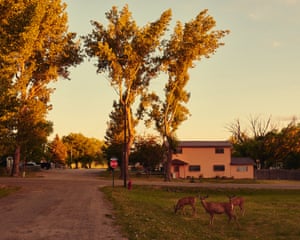
As an alternative to uranium, Telluride residents repeatedly suggested that Nucla and Naturita capitalize on the organic local food movement and return to their farming roots to provide Telluride and surrounding areas with produce, Cooper said.
This suggestion was met with eye-rolling and frustration. “I’ll be the first person in line to pick your tomatoes for $45,000 to $75,000 a year,†one local reportedly said in 2009, contrasting agricultural wages with mining income. Years later, Thompson still scoffs at the mention of organic produce. Her grandmother grew her own food and canned it, and never used pesticides. “This is our way of life,†she said.
After several years of angry public hearings, lawsuits and debates, the uranium project has been put on hold for economic reasons. In Nucla, where the spot price of uranium is printed on the front page of the newspaper, locals say it needs to reach $50 for the mill to be financially viable. The price listed on the paper in late June was $19.85.
“Telluride says a lot of dumb things,†said Paul Major, the president of the Telluride Foundation, a community philanthropy. “You know, it’s easier to sit in Telluride and yodel about going green, and a community like Nucla is going, ‘What are you talking about?’ We’re just trying to put food on our table and a roof over our heads.â€â€
It was not easy for people working in information industries, or in tourism and real estate, to understand what it was like to be dependent on extraction industries, he said.
Thompson said that during a tour of Urvan for Telluride schoolchildren, their teacher asked her: “So how do you kind of live with yourself, knowing that the town where you grew up in is where the bomb came from that killed all those people in Japan?†Thompson said: “And I just looked at him, like, are you just stupid or are you just rude? What kind of question is that?
“My grandfather was a farmer, he was a kind and gentle man that wouldn’t hurt a fly ... He had no idea what he was doing. None of them knew what they were doing.
“I had a hard time with that man even asking me that question.â€
Cooper, who was recently elected as a county commissioner in a neighboring county, representing Telluride, said she has learned the limits of the town’s helpful suggestions.
“Telluride is very well meaning in a patriarchal kind of way. We’ve got all kinds of ideas about what would be good for the West End. Unless it comes from within the West End, our ideas are not going to fly there,†she said.
She thought some of the criticisms of the resort town have merit. “I, too, am frustrated with Telluride’s energy use and with the 19-bedroom second homes that are still consuming energy when nobody is in the house year round. That said, don’t let that stop a good idea from happening. Don’t use that as an excuse not to move forward with something that would help your community.â€
Lacey Steele, a Nucla native, has been commuting to work in Telluride since she was 15 and now works at a Starbucks there. At 21, she’s starting a family and getting ready to have a baby. “Everybody there looks down on it â€" young marriage and young families,†she said. She’s one of the only people at work who’s preparing to have children at all.
She sees an imbalance of power even in the way the residents of the two towns think of each other. “I don’t believe that a lot of people in Telluride know what goes on around here. A lot of them don’t even know where we are.†And some of the work its millionaire tourist economy offers has real drawbacks: it’s seasonal, which means Steele is laid off twice a year in the spring and fall and then re-hired.
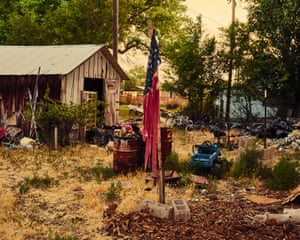
Laura Denney, a Nucla resident who does private housekeeping in Telluride, said there is an “amazing difference†in lifestyles between the two towns. At the same time, she said, the families she worked for were “really down-to-earth people†who she saw give back to the broader community. She pushed back against the negative views of Telluride residents in Nucla.
“A lot of people still have that feeling: ‘They’re just a bunch of hippies up there, just a bunch of rich people.’ You know what? It was the hippies that made Telluride rich ... If it wasn’t for the people in Telluride, a lot of us here in Nucla, Naturita and Norwood wouldn’t have jobs.â€
Residents of Nucla “do have this really strong attachment to their culture and their historyâ€, Cooper said. Over the years, she’s come to believe that attachment is mixed with shame. The history of Nucla “is not taught in schools, it’s not shared ... There’s a conflict of being both ashamed and being proud of it â€" and I think in some ways that is what has really kept that community from discovering what’s next for them if it’s not uranium.â€
Jeremy Nichols, the climate energy program director at WildEarth Guardians, the not-for-profit whose lawsuit led to the closure of Nucla’s power plant, is unabashed about his goals. “We want to shut down all coal-fired power plants. We want to keep all coal in the ground. We have a moral imperative to confront the climate crisis, and we can’t afford to say, ‘It’s OK for this power plant to run and not the others.’â€
The scheduled shutdown is “an uncomfortable situation for sure for themâ€, he said. But the timeline, and the deadline, also have benefits, he argued. They provide certainty about something that was already going to happen, and cut through the rhetoric that might suggest, inaccurately, “that coal is great and it’s going to go on forever and if anybody says otherwise, they’re lyingâ€.
The town has to take responsibility for planning its own future, and for the lack of planning in the past. “It’s a beautiful landscape, but it’s stuck in an old economy, and the old economy is going belly-up, and Nucla hasn’t planned for that,†he said.
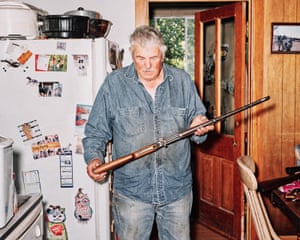
One autumn 16 years ago, Monte Naslund, whose family has worked on the irrigation ditch for decades, was at cow camp, where cattle graze in the summer in the mountains near Nucla. It was always quiet up there, but on that day he noticed something different. The rumble of airplanes overhead, a constant background buzz even on a mountaintop, had stopped. He was listening to a depth of silence he had not heard since he was a boy.
Only much later, when he came down off the mountain, would Naslund learn why it was so silent. Terrorists had flown airplanes into both the World Trade Center and the Pentagon, and civilian flights had been grounded nationwide. More than 2,000 miles from the stunned New Yorkers who had watched the towers fall, Naslund had been able to hear the nation coming to a halt.
Around Nucla these days, there’s a sense that many of the residents are listening intensely â€" that the seismic shift they are experiencing, as urban and rural priorities clash across the world, is audible to them.
Some in town are optimistic that they will find a way forward: expand the Nucla airport for commercial flights, turn the old elementary school building into a hemp manufacturing center, finally mobilize tourism to Nucla’s canyons, rivers and bike trails.
Others are doubtful that hemp will make much difference, and question whether Nucla’s natural landscape â€" beautiful, but without the show-stopping monuments of Moab or Zion â€" could ever become a true tourist destination. The town lies off the highway; it is not on the way to anywhere. Miller, who runs an Airbnb in her house, said the guests she gets stay for just one night, stopping over on their way somewhere else.
Thompson, who is also the president of the local historical society, is doing what she can to celebrate the town’s more positive history. There is a Uravan reunion picnic every year to bring together old residents of the town. In 2012, the event had attracted an estimated 1,000 people. They served yellow cake in tribute to yellowcake (milled uranium oxide). In the fall, she’s planning to host an all-terrain-vehicle tour of the entire length of the socialist ditch.
But progress on building a larger museum is slow and after years of effort, Thompson said that Nucla and Naturita still feel like an afterthought to the broader world, their culture and history less of a priority. “We really are a lower class people. I don’t know how to say that in a nice way,†she said.
For Cooper, the Telluride commissioner, Nucla was founded with a pioneering spirit, and its residents still have it.
“If they could tap into that and take advantage of it,†she said, “I think the sky’s the limit.â€
This article was co-published with Topic, a new storytelling studio. Sign up for our newsletter here

0 Response to "Under siege by liberals: the town where everyone owns a gun | US news"
Posting Komentar